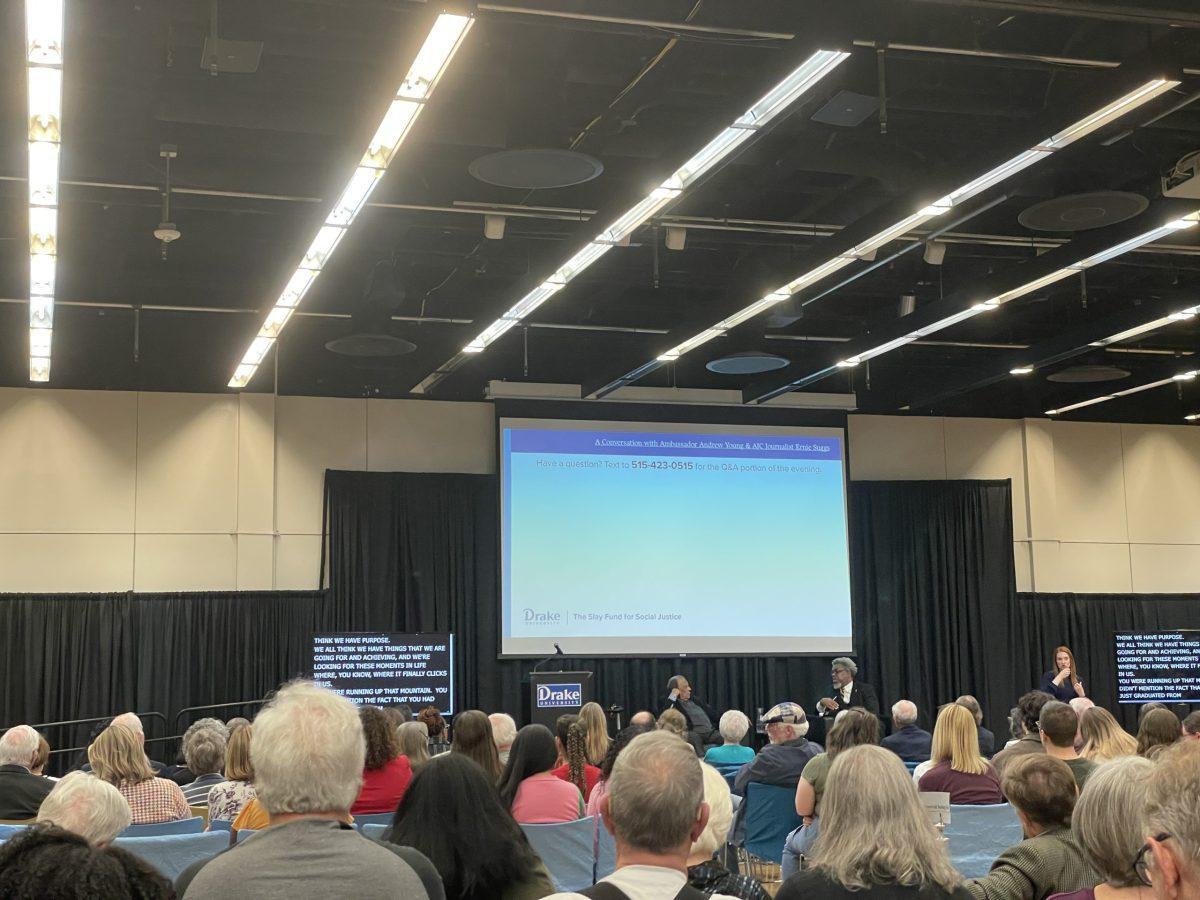On the evening of Monday, Feb. 26, Atlanta Journal-Constitution journalist Ernie Suggs sat down with former U.N. ambassador and congressman Andrew Young. They discussed racial justice topics — contemporary and historical — from an anecdotal perspective among a diverse crowd of community organizers, politicians and Drake students and faculty.
The candid way the ambassador told the story of his life, from biology student to civil rights activist, elicited laughter from the audience, which filled Olmsted’s Parents’ Hall. The conversation mostly followed the same chronological storytelling style of Suggs’ and Young’s collaborative work on the memoir and current Drake exhibit, both titled “The Many Lives of Andrew Young.”
During the discussion, Young described how combating injustice looked different to him throughout his life, from encountering inequity in the American South to his close relationship with Martin Luther King Jr. and his almost 20-year-long political career.
“Justice comes in a lot of forms,” Young said about what he learned from King.
The ambassador focused on small moments from his childhood that led to his pursuit of what Suggs characterized as “fairness.” Young emphasized his spirituality, education and family support as factors that strengthened his investment in social justice as a young reverend.
“It’s a luxury to expect everything to be right,” Young said.
The latter half of the conversation centered on Young’s involvement in the political realm. Although Young said boycotts were effective for the movement, he stressed the importance of democratic ethics.
“It doesn’t make sense that every time you want some…policy changed to have to get a thousand people…to get out and march,” Young said. “You’re supposed to be able to…call your elected representative.”
Young said that the political underrepresentation of Black constituents and American voters more broadly propelled his transition from religious leadership to holding public office, despite what Young described as the “dangerous” nature of that career.
“[King] said the next phase of the movement [was] going to be moving this energy and vitality that we had in mass demonstrations into politics,” Young said. “I always understood politics as the best way to make a decision when people have a lot of different opinions.”
During the Q & A portion of the event, moderated by Associate Provost for Campus Equity and Inclusion Terrance Pendleton, audience members sent organizers questions for the ambassador via text message.
In response to a question about the progress of the Civil Rights Movement, Young said that he believes society has significantly improved in terms of racial equality, though he pointed to police brutality and reproductive freedom as contemporary civil rights issues.
“The separation of church and state means a lot, and we have to define what it means for our generation,” Young said.
Ruwayda Egal, who spoke at Monday’s event, talked in an interview on Tuesday how the conversation about Young’s activist work informs her position as student body president.
“Any time seeing a Black man who’s a representative, who’s done all of these things in his life, especially for Africa, learning about that is always interesting. I am very influenced by him,” Egal said. “It was an important conversation.”
On Tuesday morning, organizers hosted another set of speakers during a breakfast event, “The Impact of Storytelling: Civil Rights History in Iowa and Beyond,” in the upper level of Cowles Library.
This extension of Monday’s discussion opened with remarks from Slay Fund Director Jill Allen, who said the event intended to connect Drake and Iowa civil rights history with Young’s “amazing” story.
Leo Landis, curator of the State Historical Society of Iowa, presented what he described as the “overlooked” stories of former Drake students such as social justice advocate Mary Hamilton.
In an interview with Landis after the breakfast, he said he felt his presentation aligned with the event’s goal.
“[When] you look at stories from the past, you realize that there are ripples through history [where] things…[have] improved, but when you look at issues of housing or employment or equal pay, we still aren’t where we’d like to be,” Landis said. “Understanding a rich Iowa history helps us reflect on what’s happening in society today.”
While these events primarily considered social justice through a historical frame, Suggs centered his journalistic perspective in an interview after Tuesday’s breakfast. He also thanked the Slay family for supporting Young and his visit to Drake.
“Bringing Ambassador Andrew Young to Iowa, coming myself for the first time, the stories that he has, the life he has lived, is worth being retold by him,” Suggs said. “It is very important that we get history from the people who lived it. Whenever he can come somewhere and I can help to tell that story, it is always beneficial.”
Reflecting on his life at 91-years-old during an interview at the end of his visit, Young persisted that social justice work is vital to democracy while embedding his religious convictions into the conversation.
“Freedom is a constant struggle, and what I did in the 40s, 50s and 60s is not finished. We still have as much of a struggle to redeem the soul of America now as we did back then,” Young said. “I don’t want people to become content and think that freedom is just automatic. It’s something we have to think about and vote for.”







